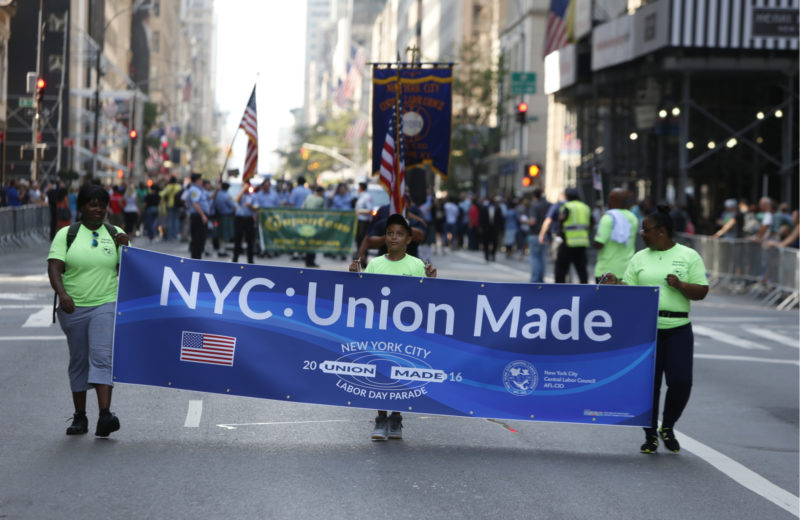Are There No Alternatives to Labor Unions?

Instead of labor unions, workers who believe that their wages are depressed by employer monopsony power ought to agglomerate their labor via corporations they own and control.
I speak not of worker co-ops designed to produce final goods themselves. Those have been tried and sometimes succeed but often do not. I am also not talking about temp agencies, though their existence proves that employers are willing to hire labor on a business-to-business basis when necessary.
The difference between a temp agency and a worker-owned labor corporation (WOLC) is that the former is run, rightly, for the emolument of the agency’s proprietors, while a properly governed WOLC would be run in the interests of its worker-owners.
A WOLC is also not a labor union. Like temp agencies, labor unions are run for the benefit of the union itself, which typically means its managers. As my mother, a self-proclaimed “factory rat,” used to say, “Union dues are just like taxes; the money I earned is taken from me without my consent and I get nothing I want in return” [expletives silently omitted].
Little wonder, then, that private (as opposed to government unions, a topic unto itself!) unionization rates are far lower in “right to work” states where union membership dues remain voluntary. That fact is telling.
While theorems and statistics are often helpful guides to policy, natural experiments constitute perhaps the most compelling way to make a policy case. Say a polity finds itself divided into two by outside forces (“exogenously”) and each adopts different policies. Within a few decades, very different economic outcomes are observed. When similar natural experiments occur in many different places, from the antebellum U.S. to Cold War Germany to the Korean peninsula to Havana and Miami, realities, like the fact that freedom creates flourishing, become increasingly difficult to deny.
Unfortunately, natural experiments, by their very nature, are not always available, or come laden with too many potentially confounding variables. Thankfully, though, real-world market tests can bolster them. Human capital flows are one such test. Was the antebellum South really all that repressive? Yeah, because poor whites, as well as slaves, fled it whenever they could. Were East Germany/North Korea/Cuba socialist hell holes? Yeah, because they blocked out-migration and in-migration was nearly nil.
So, thanks to state “right to work” laws, we know that most Americans prefer not to join unions, likely due not just to the dues but to the principal-agent problem my mother intuited.
Nevertheless, many Progressives want to revivify unions through legislation like California’s AB5 even though the overall economic effects of unionization are mixed at best — they decrease employment but raise wages and variously increase or decrease productivity. Politically, though, unions traditionally skew so heavily Left that I’m surprised President Trump hasn’t EO’d (is that a verb yet?) federal labor unions out of existence. (Why would employees need to organize against our beneficent government anyway?)
Politics aside, to recognize the principal-agent problem inherent in labor unions is pro- not anti-laborer. Essentially taxing workers extra to support union managers and their politics, after all, is difficult to defend. Ensuring that workers take home a competitive wage is pro-laborer.
So an important question is whether non-union laborers are systematically paid less than what they should be given prevailing supply and demand conditions. Progressives claim workers receive less than a competitive wage because a single employee cannot possibly stand against a megacorporation in terms of bargaining power. Workers must accept what is offered or perish. (And thank God, or good government, for minimum wage laws, which are always too low.)
Labor markets do not usually work that way, though, as employers do not so much compete against workers as they compete against other employers for workers. Workers, in other words, usually do not have to “take it or leave it” but instead can find another employer or earn a livelihood from some combination of proprietorship, investment, subsistence activities, or transfers (from family, charities, and/or government).
So I suspect that in most U.S. labor markets workers usually make something close to a competitive wage. But I do not purport to know everything. So I propose a market test, analogous to the one that I proposed in Financial Exclusion regarding financial discrimination, which argued for freer entry so that groups that feel discriminated against can form their own financial intermediaries, compete against incumbents, and thrive or die on the merits.
In the case of monopsony power in employment, let workers form WOLCs and bargain with Amazon, Mickey Dees, Uber, Walmart and other employers on a business-to-business basis, thus eliminating differential bargaining power. Then allow individual workers to voluntarily decide whether they want to work directly for a megacorporation or for a WOLC. They will, of course, gravitate toward the one that offers them the best deal.
If significant monopsony power exists in a labor market, a well-governed WOLC will be able to negotiate for a higher wage, cover its administrative/transaction costs, and pass the rest on to workers.
If monopsony power is less than a WOLC’s transaction costs, workers will have no incentive to go to the WOLC for employment and it will fold, or, in a rational world, never form in the first place. After all, unlike financial intermediaries, there exist no significant barriers to their formation.
And there chafes the rub. Do worker-owned labor corporations not exist because they are economically unnecessary or because they have yet to be tried, perhaps due to the long fixation on labor unions? I do not know but many people who describe themselves as “woke” do not appear to be “awake” to market-based (one might even say sustainable) avenues of injustice abatement. It is almost as if their stated goals (helping workers) and actual goals (political power?) profoundly differ.










